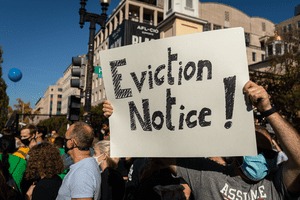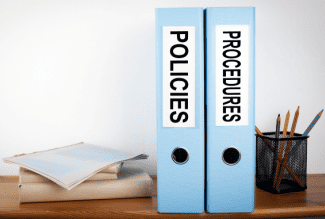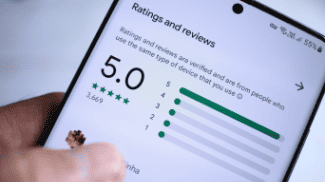All New Yorkers Facing Eviction Could Get Free Legal Help — But It Won’t Come Cheap

A coalition of nonprofit legal service providers is asking city lawmakers to set aside $461 million in the upcoming budget to hire staff to take on a rising number of eviction cases and meet a mandate that is supposed to guarantee an attorney for every low-income tenant.
Providers in the so-called “Right to Counsel” program currently have $110 million in contracts, a sum they say is not nearly enough to handle most of the 146,000 eviction cases filed by landlords since the start of last year.
Tenants qualify for full legal representation in eviction proceedings if their income is below 200% of the federal poverty line — around $29,000 for an individual and less than $60,000 for a family of four. But for many of those renters, the “right” to representation exists in name only.
Little more than a third of tenants had a lawyer in housing court through October of last year, compared to 98% of landlords, according to state data first reported by The City. In one example covered by Gothamist last month, just four of 11 formerly homeless tenants getting kicked out of their Lower East Side building had a lawyer to challenge their eviction.
“Housing is a fundamental human right and having tenants, who are usually people of color, proceed through a judicial process where their homes could be taken away from them without the assistance of an attorney is inherently unjust,” said Adriene Holder, the head of civil practice at the Legal Aid Society.
The state Office of Court Administration did not provide updated stats on the number of unrepresented tenants, but has said nonprofit groups declined 10,000 cases last year.
The request for a major funding increase comes as Mayor Eric Adams is imposing austerity measures on most city agencies, aside from the NYPD. He ordered a new round of cuts to vacant positions last week— the third such demand since taking office.
Neha Sharma, a spokesperson for the Department of Social Services, said the Adams administration could not comment on budget negotiations. Sharma also said the agency, which oversees the right to counsel programs, is “supportive of any efforts which would help slow down the calendaring of cases by the courts” — contrasting testimony by DSS’ Office of Civil Justice staff at a Council hearing last month.
“At-risk tenants remain our top priority and we continue to work to ensure that we are connecting anyone who may have been impacted to appropriate legal services and supports,” she said.
She pointed out that not all eviction filings actually move forward and many are resolved out of court. Data compiled by the Office of Civil Justice, which runs the right to counsel program, showed about two-thirds of tenants had a lawyer in court from April to June of last year.
The Council has in turn rebuked Adams’ spending cuts and recommended $195 million to fund an array of services provided by nonprofit groups, like Legal Aid and Legal Services NYC. Roughly $70 million of that funding would go directly to housing court legal assistance, an amount the Council called a “fraction of the need” and not enough to increase capacity for more cases.
Councilmember Shaun Abreu, a former tenant lawyer leading the call for more funding, said he would not support a spending plan without at least that money included. He said the state must also step in to issue funding to pay for housing attorneys.
“For me, not having right to counsel [funding], the budget would be a nonstarter,” said Abreu, who represents parts of Manhattan. “The more we invest in keeping people in their homes, the less we have to spend on shelter, and the more we have to spend on real affordable housing.”
The city enacted a partial right to counsel law in 2017, initially guaranteeing access to attorneys to tenants facing eviction in specific low-income and gentrifying neighborhoods. Four years later, with pandemic-related rent arrears mounting and an eviction freeze in place, the program expanded to cover tenants citywide. Before implementation of the law, only around 1% of tenants appeared in housing court with a lawyer, according to state court system data.
A 2021 report from the Office of Civil Justice found that about 84% of tenants who had a lawyer managed to stay in their homes.
Landlord attorneys also say facing off against another lawyer has its benefits. Tenant attorneys help streamline fair settlements, recover missed rent and make the court system run more efficiently.
“Litigation is technical and it can be overwhelming for an individual,” said Andrew Wagner, an attorney who represents property owners with the firm Herrick Feinstein. “If they’re represented by an attorney, and assuming they are competent, it makes it much easier to deal with the case and negotiate a resolution.”
Raun Rasmussen, the executive director of Legal Services NYC, said the $461 million funding request may come with sticker shock, but the upfront investment in eviction prevention will be offset by savings on shelter stays and homeless services. For now, tenants are forced to navigate the court system on their own, with potentially disastrous consequences.
“What we see coming out of cases where tenants don’t have lawyers is bad deal after bad deal after bad deal, where tenants’ rights are not recognized or acknowledged in the settlement,” he said.
Rasmussen said the money is needed to stem an exodus of attorneys tasked with representing poor clients.
 Legal Aid has 34 vacant positions, accounting for about a third of its budgeted housing attorney staff. New York City Legal Services is missing 10 lawyers, or about 39% of its staff, while New York Legal Assistance Group is down 1 in every 5 housing attorneys.
Legal Aid has 34 vacant positions, accounting for about a third of its budgeted housing attorney staff. New York City Legal Services is missing 10 lawyers, or about 39% of its staff, while New York Legal Assistance Group is down 1 in every 5 housing attorneys.
Citywide, around a third of tenants in subsidized housing owe back rent, putting them at risk of eviction, according to an analysis last month by the New York Housing Conference. Tenants in market-rate apartments also face the prospect of sharp rent hikes that price them out, or landlords that decline to renew their leases. The legal groups estimate there will be around 120,000 eviction cases filed this year, with about 71,000 households eligible for full representation based on their income.
They say they need $110 million to manage their existing 35,000 cases, $125 million to boost salaries and retain lawyers, and another $226 million to hire 887 additional attorneys and support staff.
Lawyers and their clients say the cases can take hundreds of hours over several years.
Bronx resident Diamond Maldonado worked with Legal Aid lawyer Marisol Cordero for six years as she appealed eviction orders following the death of her mother. Maldonado was not named on her mother’s Section 8 voucher; Cordero argued the error was the city’s fault and that it should not have disqualified Maldonado from the subsidy.
Cordero represented Maldonado in five proceedings, including three appeals.
Maldonado eventually lost her apartment and was forced to enter a homeless shelter, but Cordero continued representing her until she won the right to a Section 8 voucher of her own. Maldonado said she used the voucher to land an apartment near the Grand Concourse in the Bronx.
“If you don’t come across someone who is really dedicated to their job, you will get lost in the system and they won’t help you,” Maldonado said. “It doesn’t matter if you have a child, or special needs or anything like that. You will go deeper into poverty than ever.”
Source: Gothamist















 Accessibility
Accessibility